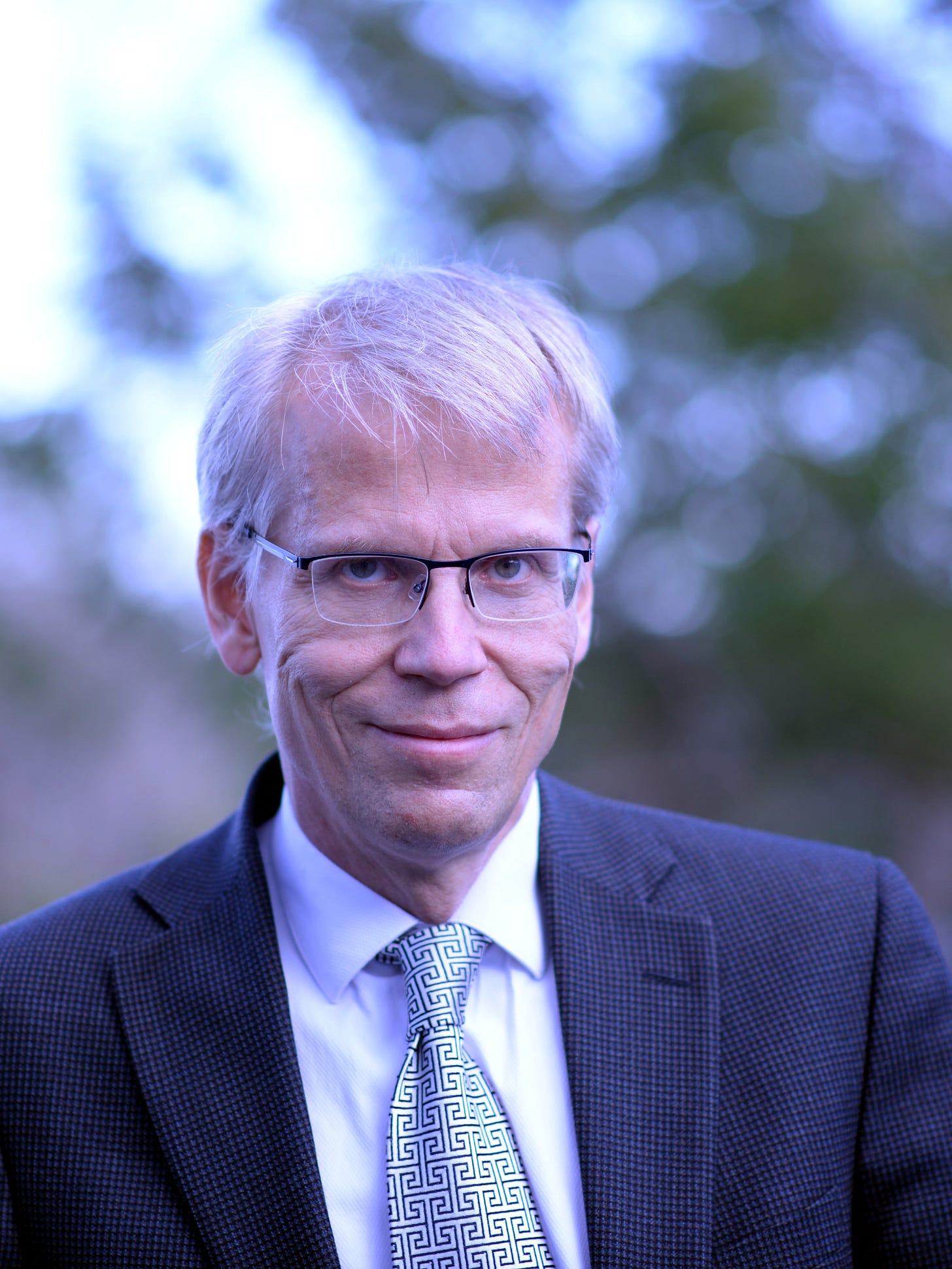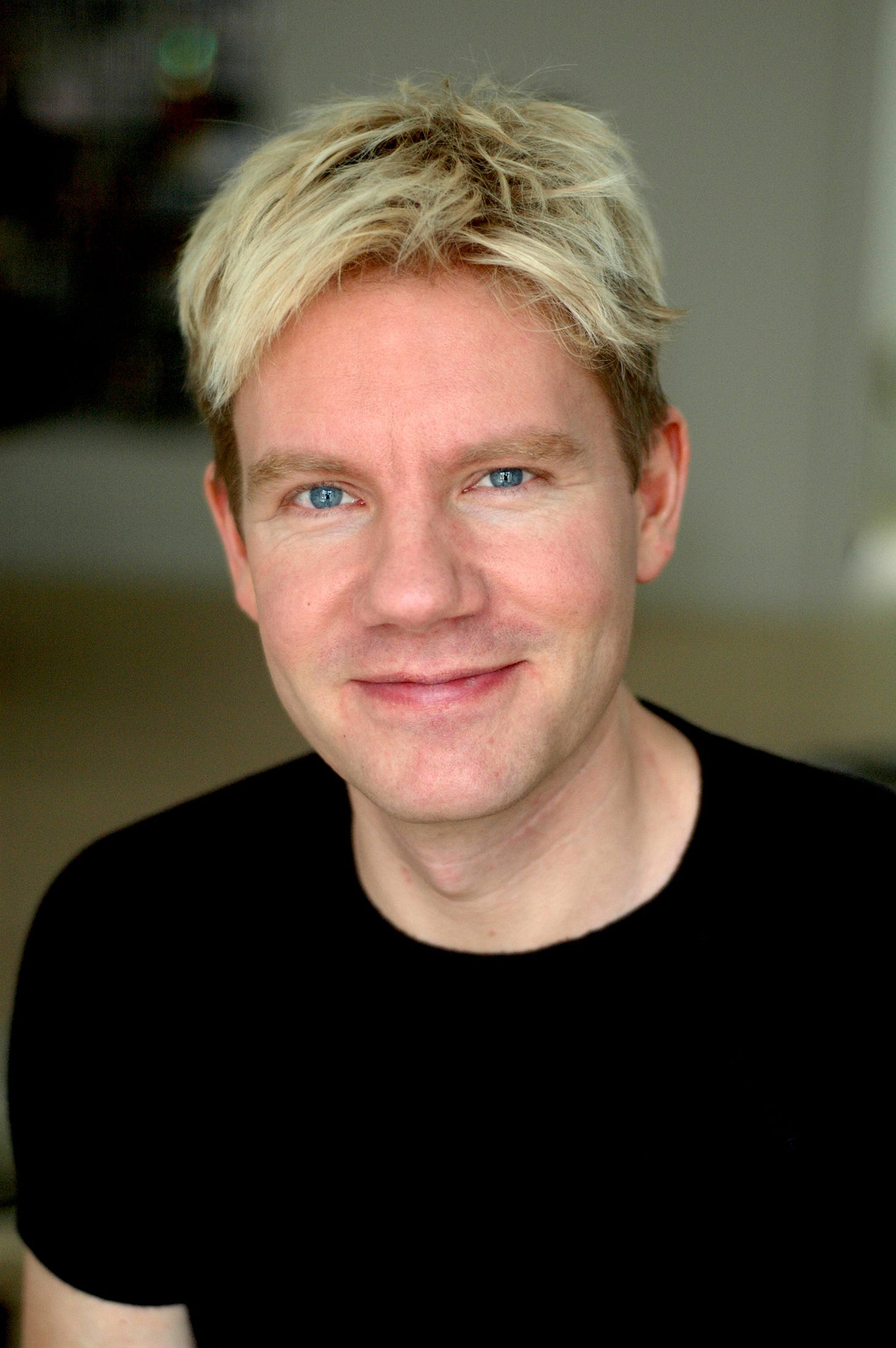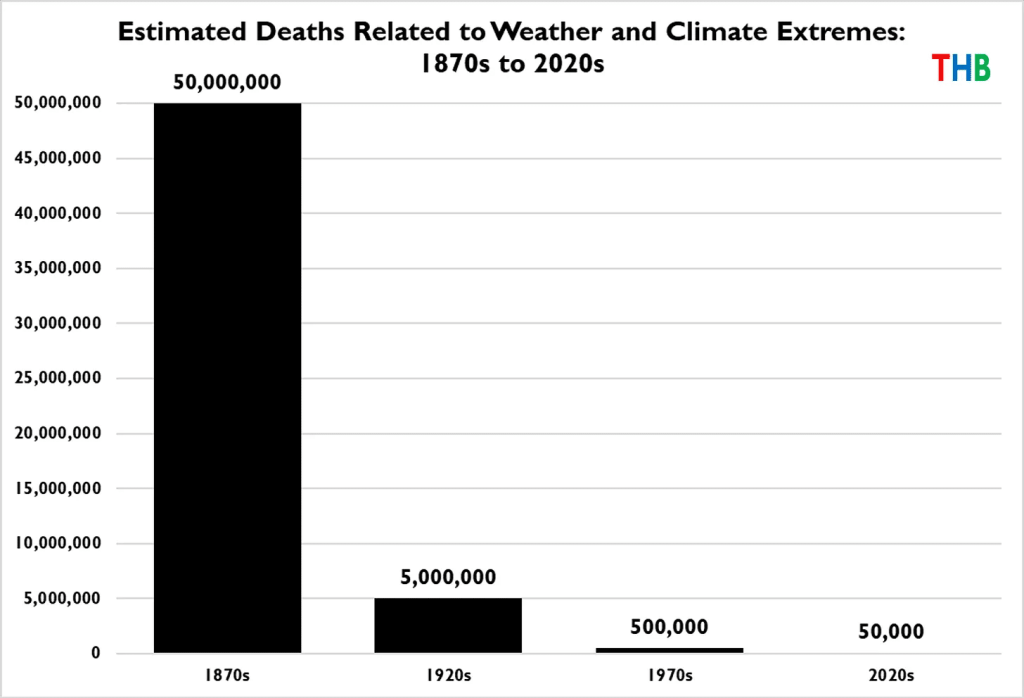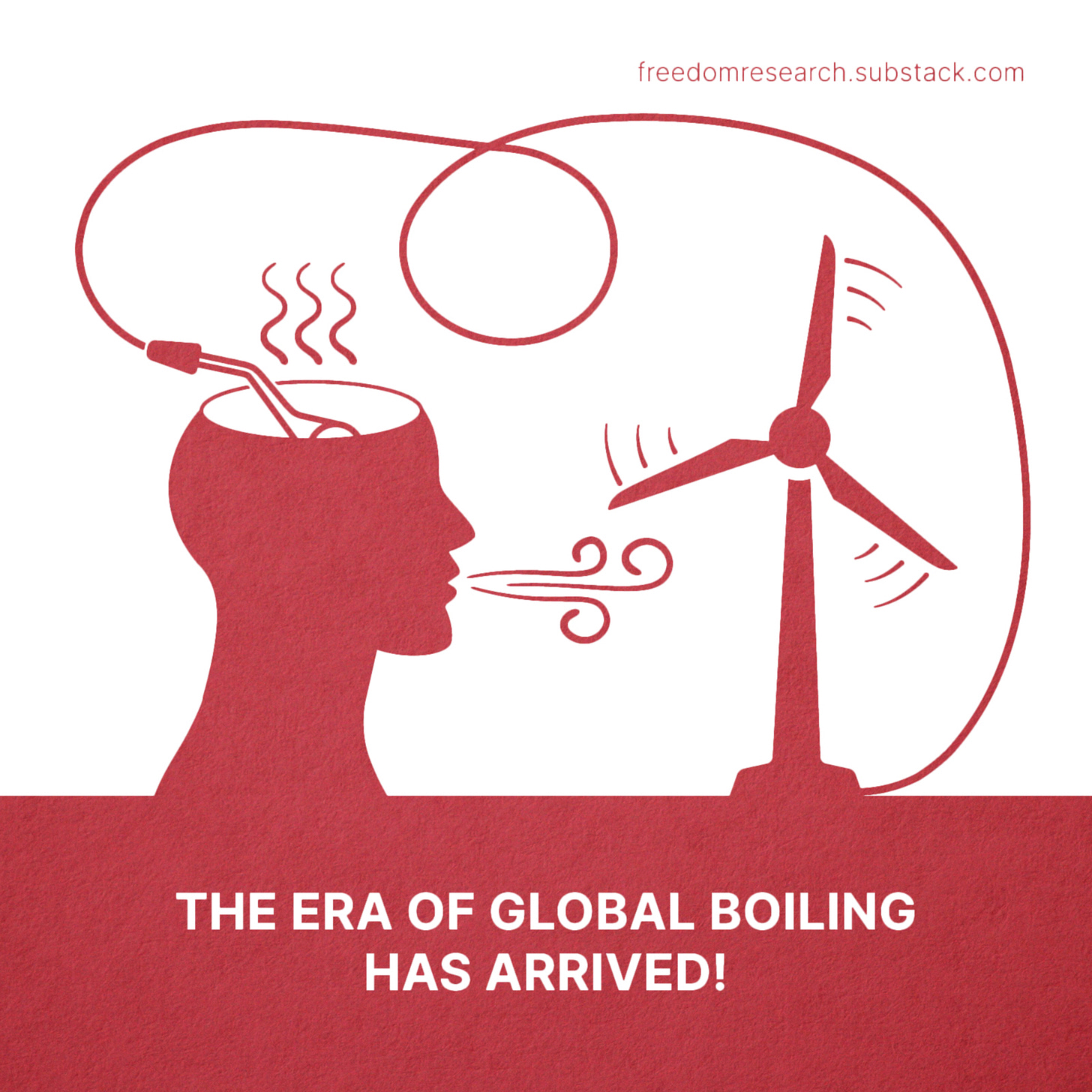Analysis: GLOBAL BOILING ERA - untouched disinformation or when fact-checking goes silent, part 1
When the authorities spread disinformation or lies, the fact-checkers are usually silent
Key messages:
Free speech is the first victim of crises, especially of ongoing "global crises".
In Western countries, restrictions on freedom of expression are deepening and authoritarian power tactics are being adopted.
The labelling of mis- and disinformation is carried out by so-called fact-checkers, who primarily perpetuate the power narrative and do not assess objectively.
Censorship became widespread during the Covid-crisis and has continued since.
The proclamation of the beginning of the "global boiling era" by those in power has not received a reaction from the fact-checkers, although it is neither supported by scientific findings nor shared by many experts.
While in totalitarian regimes free speech is restricted by direct and strict coercion, in today's democracies this is being done in more subtle ways. The latest trend, both in the EU but also in the US, is to pressure social media companies to implement censorship on a wide range of issues (migration, climate, minorities, health, etc.) when critical views do not match those approved by the authorities. In addition, a number of European countries have hate speech laws to protect "minorities", which explicitly restrict freedom of expression and threaten critics with criminal sanctions.
In Germany, Europe's largest country, the authorities have taken a particularly hard line on freedom of expression in the last decade, leading to an unprecedented low - already 44% of Germans admit they have to be careful about expressing their views and only 40% think they can still express their political opinions freely (see the graph). Since the fall of the Berlin Wall, the proportion of people who feel they speak freely has steadily declined, reaching a historic low in just the last decade.

Free speech curtailed in crises
Free speech is one of the first casualties when a society is plunged into crisis, or when a crisis, especially a lasting crisis, is evoked. If such a crisis is given a global dimension, there is every reason to expect that those in power will severely attack free speech and its critics. There are both social and psychological justifications for this: socially, emotions are heated up in a crisis and the frightened masses demand steps from point A to point B in order to overcome the crisis. Psychologically, it seems to those in power that something has to be done to overcome the crisis and that only they are willing to lead the way and also know what to do. However, many crises have shown how misguided such justifications are. Emotions and fear are the worst companions with which to take decisions at the same table.
Nick Hudson, the creator of PANDA, has aptly concluded that when a phenomenon or event is presented as a global crisis with only global solutions, accompanied by censorship of dissent, it is definitely and exclusively a scam.
The Western world has been going from one crisis to another in the last decade, so it is no wonder that the situation with freedom of expression is becoming increasingly cloudy. Whenever the authorities start to curb free speech, a sweet-sounding justification is always found - be it the fight against 'misinformation' or the defence of 'minorities'. This rhetoric is attempted to be subsumed under the banner of harm reduction. Sounds convincing, doesn't it?
But in general, the core of the harm - i.e. what and how significant the harm is - remains always unanswered. And in particular, no attention is given to the harm that is caused by the restriction on free speech in the society, because each restriction on free speech almost always leads to another.
Much of the labelling to misinformation and disinformation is based on the work of so-called fact-checkers, whose number has grown from 11 organisations in the last 15 years to 424 by 2022. Investigative journalist Paul D. Thacker pointed to the bias of fact-checkers in the summer of 2022, highlighting some of the worst fact-checkers, and how they help to spread rather than stop misinformation. One of the main functions of fact-checkers seems to be to refute inappropriate opinions and facts in the more problematic areas for the ruling elite, and to label them "false", "incorrect", "misleading".
The myths of the powers versus the facts of the censored
The activities of the censors came to prominence during the Covid-crisis, when many critics of the authoritarian power measures felt the stigmatisation of the fact-checkers and the resulting cancelling. According to Vinay Prasad, professor of epidemiology at the University of California in the US, the authorities lied about many aspects of Covid-19, such as natural immunity, masks and vaccine mandates. Dr Martin Kulldorff has pointed out how Big Tech has been instrumental in spreading misinformation from the authorities about Covid-19, including the denial of natural immunity. Marty Makary, a professor of medicine at Johns Hopkins University, has repeatedly pointed out that during the Covid-crisis, many tragic mistakes were made by those in power, from school closures and mandatory masking of children to the denial of natural immunity and compulsory vaccination of the healthy. According to Jayanta Bhattacharya, a professor of medicine at Stanford University, governments have been a primary source of misinformation, especially about public health and science. The academic discipline purporting to police disinformation selectively ignores government disinformation. As such, their primary purpose is to promote the propaganda of the powerful.

In Europe, the 'anti-disinformation' campaign has gained momentum in the corridors of power in Brussels, where the EU's initial fight against foreign propaganda (China, Russia, etc.) has spread smoothly to other areas. On climate, migration, minorities and health, taboo subjects have emerged as misinformation, even though evidence and facts tend to point in the opposite direction to that of power.
Disinformation and propaganda by the authorities have often not been followed by fact-checking, restraint and accountability. Nor should they be, if the voices of those who disagree with the authorities were equally protected and given sufficient coverage. Misinformation can only be countered by facts, more information and the ability to tolerate dissent, not by censorship or the threat of criminal prosecution.
Here we look at the following areas where the authorities have spread misinformation, misjudgements or exaggerated claims and have therefore contributed to the distorted picture of reality.
The planet's boiling point
The narrative of anthropogenic climate change has been framed as an ongoing crisis that has now been accorded global status. There are supposed to be global solutions to this global crisis, and part of these solutions are becoming restrictions on individual freedoms and on our way of life. Those who disagree with these claims and assessments, or who do not recognise the global solutions, have experienced deepening restrictions on free expression.
Naturally, a reflecting person has a number of questions about a global crisis posed in this way, and wants to get adequate answers. In the case of crises, the relationship between cause and effect is crucial, and questions such as this become decisive:
how much and to what extent the climate has warmed and how to assess these trends over time,
what the main drivers and influences of climate change on the planet might be,
what is the human capacity to influence our planet's climate,
what is the scale and extent of anthropogenic impacts; and
what are realistic and feasible steps humanity can take to reduce environmental impacts and conserve nature in an efficient and integrated way.
Experts have highlighted a number of uncertainties in the search for answers to these questions, which characterise humanity's continuing lack of knowledge about Earth's climate better than the rigid statements. Several thousand scientists around the world have unequivocally and cogently rejected claims of a global climate emergency and the apocalyptic predictions that accompany it.

Unfortunately, the questions are not adequately answered by those in power, who prefer to continue to spread scare stories and hollow solutions. For example, according to US President J. Biden's "climate czar" John Kerry, climate change needs to be decisively renamed the climate crisis in order to vigorously step up the global fight against the planet's main enemy - man-made CO2. Some have even called CO2-emitting humans the disease afflicting our planet.
Former US Vice President Al Gore, whose trademark is the 2006 anti-CO2 film "An Unconvenient Truth", declared at the World Economic Forum in Davos in January 2023, that the oceans are already boiling, "atmospheric rivers" are forming and "rain bombs" are hitting the Earth because of man-made climate change. In Gore's case, it has been pointed out that he has made tens of millions from supporting 'green' investments, backing such global business for years with public scare-mongering messages and predictions that have largely turned out to be false.
At the same event in Davos, UN Secretary General António Guterres declared that fossil fuels were cooking our planet, and he turned the tables even further in a speech in July of that year, when he heralded the beginning of a new era of extraordinary crisis:
"The era of global warming is over, the era of global boiling has arrived."
He added that the air has become unbreathable and air temperatures unbearable. The World Economic Forum, in turn, amplified this message, claiming that the events of July (summer heatwave) would have been "extremely rare" without man-made climate change.
The fact-checkers neither bothered to refute such claims nor labelled them as "false", "misleading", "not accurate" or ridiculous (even schoolchildren know the boiling point of water), although a number of studies point to facts that show these claims to be false.
There have been several periods in history, including recent history, when our planet's climate has been much warmer than it is now. This has not meant the demise of civilisation, but rather a warmer climate is associated with faster development and the expansion of civilisation. Scientists have reconstructed the temperatures of earlier periods using indirect sources such as boreholes, ice cores, or fossils. In this way, experts have shown that around 5000 years ago the eastern Mediterranean was about 1.5 degrees warmer than it is today. The climatic conditions of the Holocene, the last p ost-glacial period, are fairly well documented - at its warmest, between 9000 and 5000 years ago, the Earth was even 1.5 to 2.5 degrees warmer than today. For example, in the Baltic Sea region, temperatures were 1-3.5 degrees warmer than today nearly 4500 years ago. Both in Iceland and elsewhere, ancient massive forest areas have been discovered under glaciers, clearly indicating a warmer climate around 3000 years ago. And the examples go on.
Also in more recent times, air temperatures on our planet have been higher or similar to those of our present 'boiling point'. However, in the late Middle Ages, there was a 'Little Ice Age' (1550-1850), when, for example, the River Thames in London was frozen over and many frost fairs were held. Since the 19th century, we have been experiencing a period of gradual emergence from the Little Ice Age.

There is also an attempt to give the impression that heat deaths are a serious problem today, an alleged feature of the damage caused by climate change. In reality, the average number of cold deaths in Europe is ten times higher than the average number of heat deaths (see graph).

In addition, it is intended to show that climate change has increased the frequency of natural disasters and catastrophes, and that these are causing much greater damage than before. Among others, Roger Pielke Jr. has pointed out the invalidity of these claims and shown, based on research by Mike Davis, that the losses in the recent past are likely to be many times greater than today's (see graph below).

Experts have consistently pointed out that the Earth's climate is cyclical, that the Sun has significant influence on what happens on our planet, and that science is still a long way from understanding all the complexities. Yet a certain one-sided climate change narrative is being imposed by force and suppressing a whole scientific debate that would contribute to a better understanding of the increadible nature around us. When a scientist claims that science is settled, he has already stepped outside science, according to atmospheric physicist Dr Richard Lindzen. Professor Norman Fenton's own experience of climate science has shown that lying in the name of 'the greater good' is common.
But according to ex-politician and activist Al Gore, man-made climate change is also creating large numbers of climate migrants, expected to reach one billion this century. History has shown that migrants are on the move in both hot and cold weather, and that far more important than climate change are wars, authoritarian regimes and the 'open borders' policies of Western countries, which have driven large numbers of people out of Africa and the Middle East.
Continues with part 2 “Analysis: IMMIGRATION EFFECTS - untouched disinformation or when fact-checking goes silent”







Thank you for the article with many interesting links, but I fundamentally disagree with the essential message you give on the climate. The physics of radiative forcing, which is the fundamental driver of increasing surface earth temperature from atmospheric gases well understood for over 100 years. The atmosphere acts like a duvet, being transparent to incoming solar radiation and opaque to the loss of heat infrared radiation back from the earth to space. Pouring millions of tons of CO2 into the atmosphere will inevitably warm the surface of the earth. Climate is a complex system (not complicated, like a watch) with complex differential equations using at least 25 parameters, some of which have very wide range of possible values with both positive and negative feedback loops and singularities as tipping points, but the trend is overwhelmingly obvious. I have been to the high mountains for over 50 years and the shrinkage of glaciar ice is obvious. The changes in animal and plant behavior in our own gardens is obvious to anyone with an inquiring outlook. The seed catalogues offer varietarying aspects of the ‘climate change agenda’. You could find scientists willing to write papers and appear in court to deny smoking caused cancer and asbestos caused mesothelioma long after it was realistically no longer tenable to do so. The various statemetnts etc by politicians are of the type called ‘announceable’ in the UK, ie something to say while ensuring nothing actually gets done. The hidden inflluences of pharmaceutical industry will be well known to most readers, but there are massive hidden influences of all the various opaque foundations, institutes etc set up by industry money and wealthy individuals to muddy the waters. The Koch brothers massively outgun Greta Thunberg in the corridors of power.ies that would be impossible to grow in the UK climate a few decades ago. If course the planets climate has varied over the last thousands of years and by cherry picking different times, almost any thesis can be supported.
You can of course find lots of scienttsts denying varying aspects of the ‘climate change agenda’. You could find scientists willing to write papers and appear in court to deny smoking caused cancer and asbestos caused mesothelioma long after it was realistically no longer tenable to do so. The various statemetnts etc by politicians are of the type called ‘announceable’ in the UK, ie something to say while ensuring nothing actually gets done. The hidden inflluences of pharmaceutical industry will be well known to most readers, but there are massive hidden influences of all the various opaque foundations, institutes etc set up by industry money and wealthy individuals to muddy the waters. The Koch brothers massively outgun Greta Thunberg in the corridors of power.